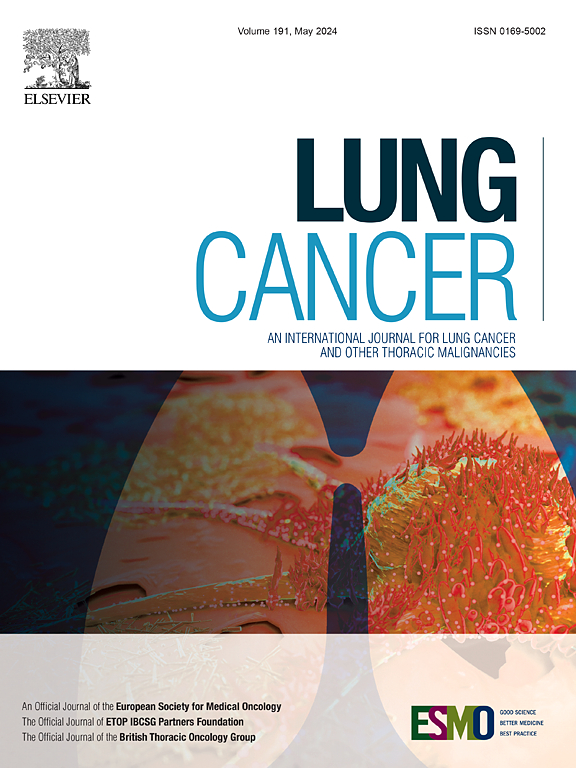Cost-effectiveness and budget impact of lung cancer screening in time of immunotherapy
IF 4.4
2区 医学
Q1 ONCOLOGY
引用次数: 0
Abstract
Background
Lung cancer screening in high-risk populations with low-dose computed tomography (LDCT) reduces lung cancer mortality by detecting cancer at early stage. Immunotherapy improves survival in these patients. This study evaluates the cost-effectiveness and budget impact of LDCT screening extending immunotherapy to early-stage patients.
Methods
A micro-simulation model Simulation Model on Radiation Risk and cancer Screening (SiMRiSc, validated against NELSON results) was used to a Dutch heavy smokers cohort. Average cost-effectiveness ratio (ACER), lung cancer mortality reduction, and budget impact of biennial screening for heavy smokers aged 55–74 (adapted from the UK strategy) were evaluated in context of immunotherapy, compared with no-screening. A cost-effectiveness threshold was set at 60 k€ per life year gained (LYG).
Results
Compared with no-screening, limiting immunotherapy to advanced-stage patients, screening resulted in ACERs of 4.7 k€/LYG for males and 6.6 k€/LYG for females, reducing lung cancer mortality by 18.1 % and 17.1 %, respectively. Extending immunotherapy to all stages increased ACERs to 5.2 k€/LYG for males and 7.1 k€/LYG for females, with lung cancer mortality reduction of 21.1 % and 20.1 %, respectively. Budget impact analysis shows screening saved 35–52 million€ when immunotherapy restricted to advanced-stage, and 24–39 million€ for all stages immunotherapy over three-screening rounds compared with no-screening, primarily due to a 53 % reduction for advanced-stage cases.
Conclusion
Lung cancer screening in high-risk population remains cost-effective when immunotherapy is offered to all stages. By shifting diagnoses from advanced to early stages, screening yielding substantial savings. These findings support LDCT screening implementation even in healthcare systems broadly using immunotherapy.
免疫治疗时肺癌筛查的成本-效果和预算影响
背景:在高危人群中使用低剂量计算机断层扫描(LDCT)筛查肺癌,通过早期发现癌症来降低肺癌死亡率。免疫治疗提高了这些患者的生存率。本研究评估了LDCT筛查将免疫治疗扩展到早期患者的成本效益和预算影响。方法采用微观模拟模型simmrisc (Simulation model on Radiation Risk and cancer Screening)对荷兰重度吸烟者进行模拟。在免疫治疗的背景下,与不进行筛查相比,评估了55-74岁重度吸烟者两年一次筛查的平均成本-效果比(ACER)、肺癌死亡率降低和预算影响(改编自英国策略)。成本效益阈值设定为每获得生命年(LYG) 6万欧元。结果与未筛查的晚期患者相比,筛查导致男性ACERs为4.7 k€/LYG,女性为6.6 k€/LYG,肺癌死亡率分别降低18.1%和17.1%。将免疫治疗扩展到所有阶段,男性ACERs增加到5.2 k欧元/LYG,女性ACERs增加到7.1 k欧元/LYG,肺癌死亡率分别降低21.1%和20.1%。预算影响分析显示,当免疫治疗仅限于晚期时,筛查节省了3500 - 5200万欧元,与不筛查相比,在三轮筛查中,所有阶段的免疫治疗节省了2400 - 3900万欧元,主要原因是晚期病例减少了53%。结论对高危人群进行肺癌筛查,在所有阶段均给予免疫治疗,仍然具有成本效益。通过将诊断从晚期转移到早期,筛查可以节省大量费用。这些发现支持LDCT筛查的实施,甚至在医疗保健系统广泛使用免疫疗法。
本文章由计算机程序翻译,如有差异,请以英文原文为准。
求助全文
约1分钟内获得全文
求助全文
来源期刊

Lung Cancer
医学-呼吸系统
CiteScore
9.40
自引率
3.80%
发文量
407
审稿时长
25 days
期刊介绍:
Lung Cancer is an international publication covering the clinical, translational and basic science of malignancies of the lung and chest region.Original research articles, early reports, review articles, editorials and correspondence covering the prevention, epidemiology and etiology, basic biology, pathology, clinical assessment, surgery, chemotherapy, radiotherapy, combined treatment modalities, other treatment modalities and outcomes of lung cancer are welcome.
 求助内容:
求助内容: 应助结果提醒方式:
应助结果提醒方式:


